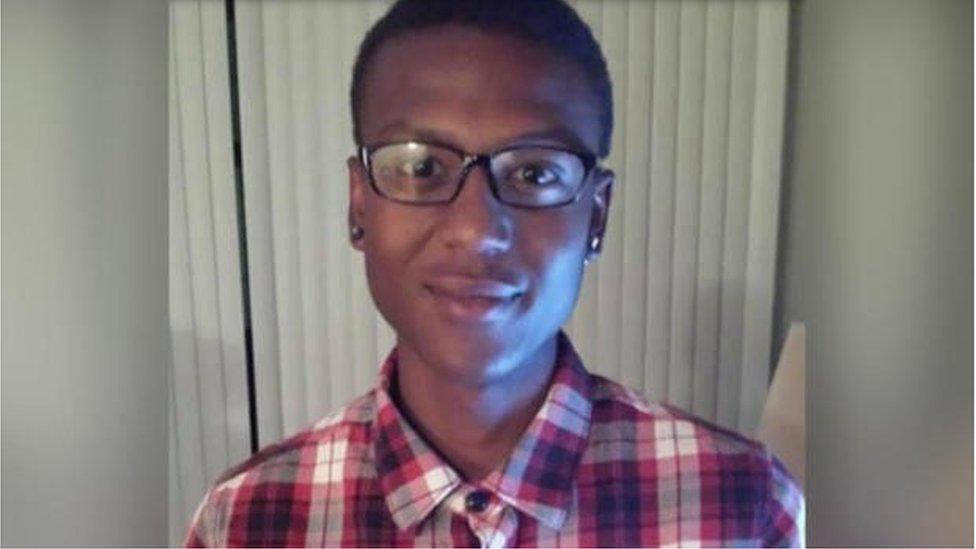Elijah McClain: Colorado to review black man's death in custody
- Published

Elijah McClain died after police put him in a chokehold and a medic injected him with ketamine
Colorado is to re-examine the death of a young black man in police custody after growing outrage and a petition signed by more than two million people.
Governor Jared Polis said confidence in law enforcement was "incredibly important now more than ever".
Elijah McClain died after being put in a chokehold and injected with ketamine in Denver last year.
His case is among several to receive renewed attention following the death of George Floyd last month.
Mr Floyd's alleged murder by Minneapolis police has prompted a wave of demonstrations worldwide against police brutality and institutional racism.
On Thursday, New York police said an officer who appeared in footage to use a banned chokehold during an arrest in Queens on Sunday had been arrested and charged with strangulation.
New York police banned the chokeholds in 1993 and earlier this month Governor Andrew Cuomo signed legislation making their use a crime.
What did Governor Polis say?
In a series of tweets, he said he had heard from many Coloradans who had "expressed concerns with the investigation of Elijah McClain's death".
"A fair and objective process free from real or perceived bias for investigating officer-involved killings is critical," he said.
"As a result, I have instructed my legal council to examine what the state can do and we are assessing next steps."
Nearly 2.7 million people have signed a petition demanding justice and calling for a more in-depth investigation be held.
What happened to Elijah McClain?
The unarmed 23-year-old was walking in the Denver suburb of Aurora on 24 August last year when he was stopped by three white police officers.
A district attorney report, external later said there had been an emergency call about a "suspicious person" matching his description.
There was a struggle after Mr McClain resisted contact with the officers, who wanted to search him to see if he was armed, the report says. On body cam footage Mr McClain can be heard saying, "I'm an introvert, please respect my boundaries that I am speaking".
One of the officers then says "he is going for your gun" and they wrestle him to the ground and put him in a chokehold.
The report says Mr McClain lost consciousness, was released from the chokehold and began to struggle again.

Mr McClain played music to animals in a shelter to prevent them from feeling lonely
The officers called for assistance, with fire fighters and an ambulance responding. A fire medic injected Mr McClain with 500mg of the drug ketamine to sedate him.
Mr McClain was then put in "soft restraints" on a stretcher and put inside the ambulance. The medic who had administered the drug then noticed that Mr McClain's chest "was not rising on its own, and he did not have a pulse". He was declared brain dead on 27 August.
Mr McClain's family allege that the officers used excessive force for about 15 minutes as Mr McClain vomited, begged for them to stop and repeatedly told them he could not breathe. The officers also threatened to set a police dog on him, the family said.
The family's lawyer Mari Newman said footage of the incident showed that "the police were nothing short of sadistic, brutalizing and terrorising a gentle, peaceful man as he lay there begging".
An coroner's autopsy found the cause of death to be undetermined.
Who was Elijah McClain?
Ms Newman described him as an "angel among humans" who played his violin to animals at a shelter that were waiting to be adopted "so they wouldn't be lonely".
His mother Sheneen McClain wrote on a fundraising page that he "brought joy to everyone who met him. The world is a darker place without him".
She said he loved running because of the sense of freedom it gave him, enjoyed drawing and had taught himself to play the piano, guitar, cello and violin.
He was "changing this world, one by one, wherever he went with acceptance of ourselves and what makes us happy", she said.
What happened to the investigation into his death?
In October, Mr McClain's family demanded an independent investigation and for the officers to face murder charges.
But in his November report, Adams County District Attorney Dave Young said he would not charge the officers.
"Based on the investigation presented and the applicable Colorado law, there is no reasonable likelihood of success of proving any state crimes beyond a reasonable doubt at trial," he said.
In January the city of Aurora launched an external investigation but earlier this month fired the lawyer leading it, a former police officer specialising in use of force cases, after concerns were raised about his neutrality.
Four numbers that explain impact of George Floyd
Officials told US media they were now launching a new review of the case and were "considering a panel of experts from across the country".
In a statement to CBS News, McClain family lawyer Mari Newman said Aurora "has no intention of taking responsibility for murdering an innocent young man. Its entire effort is to defend its brutality at all costs, and to lie to the public it is supposed to serve".
Meanwhile District Attorney Young this month told Colorado Politics he was "not going to open up an investigation because people are signing a petition".
Earlier this month Aurora police banned the chokehold used on Mr McClain. New rules also say officers must intervene if they see a colleague using excessive force.
George Floyd protests: Have the police changed?